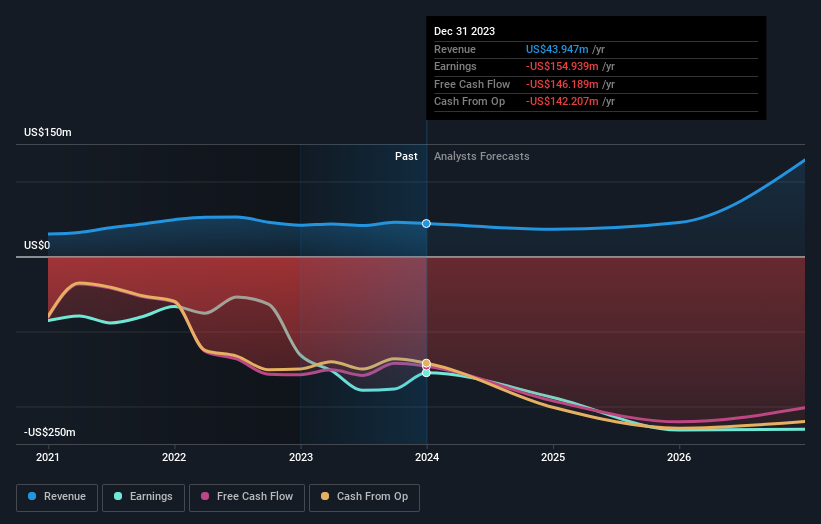Earnings Update: Merus N.V. (NASDAQ:MRUS) Just Reported And Analysts Are Trimming Their Forecasts
As you might know, Merus N.V. (NASDAQ:MRUS) last week released its latest full-year, and things did not turn out so great for shareholders. It was a pretty negative result overall, with revenues of US$44m missing analyst predictions by 2.6%. Additionally, the business reported a statutory loss of US$3.00 per share, larger than the analysts had forecast prior to the result. Earnings are an important time for investors, as they can track a company's performance, look at what the analysts are forecasting for next year, and see if there's been a change in sentiment towards the company. With this in mind, we've gathered the latest statutory forecasts to see what the analysts are expecting for next year.
See our latest analysis for Merus
Taking into account the latest results, the twelve analysts covering Merus provided consensus estimates of US$36.3m revenue in 2024, which would reflect an uncomfortable 17% decline over the past 12 months. Per-share losses are supposed to see a sharp uptick, reaching US$3.15. Before this latest report, the consensus had been expecting revenues of US$38.4m and US$3.09 per share in losses.
The consensus price target rose 22% to US$55.00, seeming to imply that weaker revenue sentiment is not expected to have a major impact on the company's valuation. That's not the only conclusion we can draw from this data however, as some investors also like to consider the spread in estimates when evaluating analyst price targets. The most optimistic Merus analyst has a price target of US$65.00 per share, while the most pessimistic values it at US$42.00. These price targets show that analysts do have some differing views on the business, but the estimates do not vary enough to suggest to us that some are betting on wild success or utter failure.
One way to get more context on these forecasts is to look at how they compare to both past performance, and how other companies in the same industry are performing. These estimates imply that revenue is expected to slow, with a forecast annualised decline of 17% by the end of 2024. This indicates a significant reduction from annual growth of 8.1% over the last five years. Compare this with our data, which suggests that other companies in the same industry are, in aggregate, expected to see their revenue grow 17% per year. It's pretty clear that Merus' revenues are expected to perform substantially worse than the wider industry.
The Bottom Line
The most obvious conclusion is that the analysts made no changes to their forecasts for a loss next year. Unfortunately, they also downgraded their revenue estimates, and our data indicates underperformance compared to the wider industry. Even so, earnings per share are more important to the intrinsic value of the business. There was also a nice increase in the price target, with the analysts clearly feeling that the intrinsic value of the business is improving.
With that in mind, we wouldn't be too quick to come to a conclusion on Merus. Long-term earnings power is much more important than next year's profits. At Simply Wall St, we have a full range of analyst estimates for Merus going out to 2026, and you can see them free on our platform here..
Before you take the next step you should know about the 2 warning signs for Merus that we have uncovered.
Have feedback on this article? Concerned about the content? Get in touch with us directly. Alternatively, email editorial-team (at) simplywallst.com.
This article by Simply Wall St is general in nature. We provide commentary based on historical data and analyst forecasts only using an unbiased methodology and our articles are not intended to be financial advice. It does not constitute a recommendation to buy or sell any stock, and does not take account of your objectives, or your financial situation. We aim to bring you long-term focused analysis driven by fundamental data. Note that our analysis may not factor in the latest price-sensitive company announcements or qualitative material. Simply Wall St has no position in any stocks mentioned.

